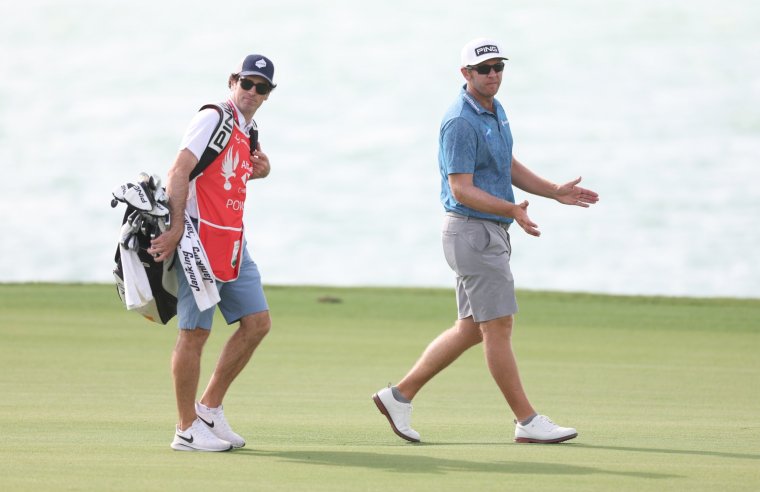The golfing tensions of 2022 have carried over into the first DP World Tour event of the year in Abu Dhabi, where a number of LIV Golf defectors continue their pursuit of ranking points while they still can.
The desire of the DP World Tour to ban LIV players will be decided at arbitration next month. In the meantime, the likes of Ian Poulter, Lee Westwood, Henrik Stenson and Patrick Reed share a DP World Tour locker-room with big name supporters of the established tours, including Shane Lowry, Tommy Fleetwood and Tyrell Hatton.
The LIV footprint continues to grow with the announcement of a US broadcast deal with The CW Network, which has a reach of 65 million viewers and is owned by major broadcaster CBS. The channel will show LIV’s 14 elite 54-hole invitational events, beginning in Mexico next month.
Before that, the conventional 72-hole stroke play PIF Saudi Invitational, formerly sanctioned by the DP World Tour, takes place in at the King Abdullah Economic City. The tournament is now sanctioned by the Saudi-backed Asian Tour, which is the fall-back option for LIV players to acquire ranking points should the court case go against them. LIV pioneer Phil Mickelson is included in the field.
Though LIV suffered the departure of key executives late last year – director of franchises Matt Goodman and chief executive officer Atul Khosla – and has yet to finalise the 2023 calendar, the sense that momentum might be cooling is offset by the television announcement.
Though the hope among some players is that 2023 might yet be the year of rapprochement, the looming Netflix documentary “Full Swing”, which showcases next month, is set to lay bare the visceral nature of the dispute among the game’s big ticket sellers. Poulter continued to stir the pot with observations from Abu Dhabi, claiming he might not play in the Ryder Cup even if he were to qualify.
Others were more conciliatory. Shane Lowry spoke about the need to ensure the game is in a good place for the next generation, that the sport passed down to the current crop by Jack Nicklaus and Arnold Palmer in the United States and Seve Ballesteros and Jose Maria Olazabal in Europe survives the seismic shifts triggered by the arrival of LIV Golf.
The PGA Tour’s response to the new landscape has been to announce a series of elevated events with enhanced prize money, including the Phoenix Open, RBC Heritage, Wells Fargo and Travelers Championships. Players will compete for $20m purses, only $5m shy of the 54-hole jackpot available to LIV golfers.
Seamus Power, who turns 36 in March, is among a cohort of middle-ranked golfers whose earning potential has been transformed by recent events. Power is a late developer, his CV decorated by just two minor PGA Tour victories. Yet here he is competing for prize funds beyond his imagination when he won his PGA tour card in 2017.

“It’s crazy,” he said. “My caddie and I were talking about this only a couple of days ago. Some of the figures going around, it’s just astronomical some of these prize funds and stuff. I’m one of those people that I love playing the game of golf. The fact that the prize money has gone up is great, but that’s never why I was in it. Guys late 40s and more must be looking at it and want to punch the lot of us just with the explosion of the money.”
The winner of the Abu Dhabi HSBC Championship will earn $1.53m, one of four tournaments on the DP World Tour with a bumper $9m prize fund. The others are next week’s Desert Classic, the Scottish Open in July and September’s BMW Championship. The season decider – the DP World Tour Championship in Dubai – carries the highest purse of $10m. Though the scale of the upgrade is dwarfed by the elite PGA Tour purses, the strategic alliance with the American tour is itself a guarantee of continued growth, pledged to increase annually over the next 13 seasons.
By establishing closer ties with the PGA Tour, the DP World Tour has achieved the remarkable paradox of basking in its inferiority whilst enhancing its prospects of survival in a divided sport that, in the opening weeks of 2023 at least, shows few signs of coming together.


Jimmy Carter was right about Israel